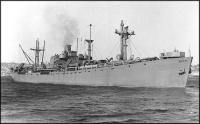
WWII Liberty ship like the John Harvey
Yesterday, we posted the obituary of Claude Holloway, a British Motor Torpedo Boat commander, who heroically saved dozens of sailors in the German attack on Bari, Italy in 1943. Holloway was nearly killed by mustard gas bombs secretly carried aboard the American Liberty ship, SS John Harvey. Ironically, the explosion of this secret mustard gas and its terrible aftermath, may have helped save countless lives.
The SS John Harvey was carrying a secret cargo of 2,000 M47A1 mustard gas bombs. The use of chemical weapons in war was banned by the Geneva Protocol of 1925. There was, however, no ban on their manufacture or transport. (That ban was not enacted until 1972.) The Allies were concerned that the Germans might use chemical weapons in World War II and wanted to be in a position to retaliate if such weapons were used against them.
In August of 1943, Roosevelt approved the shipment of chemical munitions containing mustard agent to the Mediterranean theater. Two thousand mustard bombs were loaded onto the USS John Harvey, commanded by Captain Elwin F. Knowles. The ship was waiting to unload in Bari, Italy when German planes attacked on December 2, 1943.
The John Harvey exploded, killing all of its crew and spreading liquid mustard gas across the harbor in the air and the water. As the cargo was secret, no one in the harbor knew that the clear chemical with a slight garlic odor was deadly, until the effects became evident. 628 military victims were hospitalized with mustard gas symptoms, and by the end of the month, 83 of them had died. The number of civilians hurt or killed by the mustard gas was never recorded. The existence of the mustard gas continued to be kept secret after the explosion.
Lieutenant-Colonel Stewart Francis Alexander, an American doctor from New Jersey and an expert on chemical warfare, was sent by the Deputy Surgeon General of the US Army to figure out what had happened. After running numerous test and plotting the effected area, he was able to determine that the agent was mustard gas and the center of the explosion was the SS John Harvey. In the process of testing for the unknown agent, Dr. Alexander observed that mustard gas kills white blood cells. White blood cells are capable of rapidly dividing, which prompted Dr. Alexander to wonder whether it might also be useful in killing rapidly dividing cancer cells, as well.
Based on Dr. Alexander’s field work, two pharmacologists at Yale, Louis S. Goodman and Alfred Gilman, who had been hired by the military to study the possible uses for mustard gas, developed the first anti-cancer chemotherapy drug, mechlorethamine, to treat lymphoma. Mechlorethamine was the first of many alkylating antineoplastic agents, a major class of chemotherapy drugs, which would be developed to combat a variety of cancers.
How many have been saved by cancer drugs as a result of the tragedy of Bari and the SS John Harvey? Would these drugs have been developed independently? How much longer would it have taken to develop them? One writer, Paul Drye, refers to the SS John Harvey as the “Saviour of Millions.” Whether or not this is an exaggeration, it is hard not to be struck by the irony that the most deadly of weapons, indeed one of the few weapons considered too horrible to use on the battle field, would prove crucial in developing life saving drugs to fight the deadliest of diseases. .

I was diagnosed with 3rd stage Hodgkin’s in 1976. They treated me with a drug called procarbzone. They handed out a little pamphelt that said the drug was derived from mustaed gas. I assumed then that it had been developed in a lab. Over the years I became interested in military history and learn the full story a few years ago. it is humbling to think that all those people died and I benifited from it. I thank GOD for the blessing HE has given me everyday and realize that simetimes those blessing can ciome in disguise, Romans 8.28 reminds us that all things work together for the greater glory of GOD.
Andy A.